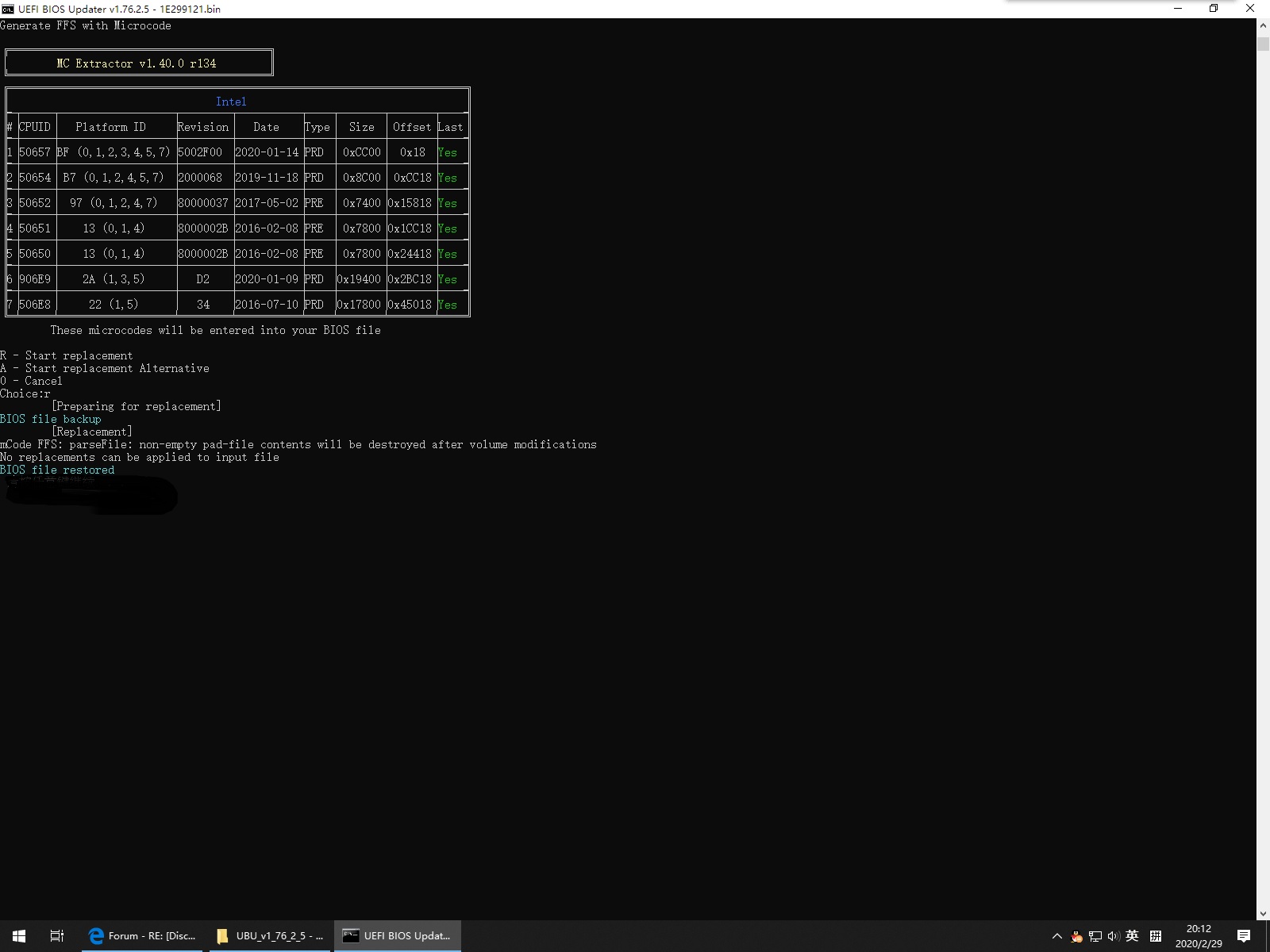Hello everyone. I would like to clarify two things about UBU tool. First of all, as far as I understand, this tool is safe and suitable for both Intel and AMD platforms, right? Also, is it supporting all motherboard makers? Specifically, I would like to know about MSI boards. I’ve used UBU on ASrock and ASUS and it works flawlessly but never tried MSI and would like to know if there are any issues with it.
@izajasz
This software is used by many people. If there is any problem, it will be corrected and updated by Sonix.
@thinking Yes, I am aware, but I’ve never processed a BIOS from MSI boards, and I will have to soon, but earlier this month I flashed a modded BIOS on MSI B350 Gaming Pro Carbon and it had problems with the USB device and LAN adapter, but it was probably malfuctioning before the mod. Anyway, I would like to know from You guys if You have encountered any problems with MSI boards?
@izajasz
Some problems are caused by MSI products themselves, but after all, there are risks in flashing BIOS. If it is not necessary, do not flash BIOS.
Yes, of course. That I know, but it would be better for me to hear some feedback if someone already tried UBU on MSI BIOS’es, for instance, z270 ones. So far, every ASRock and ASUS mobo I’ve modded with UBU works flawlessly.
@Fernando : The app works after updating the RST modules to v17.8. I think I replied in the wrong thread.
@thinking : UBU completes successfully but the board gets bricked. Maybe UBU should detect that this BIOS is incompatible with the standard replacement method.
Edit by Fernando: Unneeded fully quoted posts removed (to save space)
I created two BIOS files with UBU - one with "Start Replacement" and one with "Start Replacement Alternative". The only modification was the microcode update. The "Start Replacement" BIOS always results in a brick while "Start Replacement Alternative" one works fine.
Perhaps UBU should maintain a blacklist for each motherboard if an incompatible BIOS is identified.
@kathampy
I’m sorry, I just tried. It’s the opposite of you,
The “Start Replacement Alternative” BIOS always results in a brick while “Start Replacement” one works fine.
I guess it may be some problems in Python programming, and this is the board of the server CPU.
It depends on the specific motherboard’s BIOS. Previously in UBU, MSI X299 BIOS required an alternate method. Now it seems that EVGA X299 BIOS does.
I have yet another question about UBU. I want to mod a Supermicro X11SAE-F mobo, but when i replace EFI GOP, network efi drivers and roms and CPU microcode i get “section with uknown type” dialog messages during the proces. Should i be concerned of bricking the mobo if i flash UBU modded BIOS to this mobo ? or is it safe to ignore and count on it to work? Here is a screenshot of an example process:
EDIT: Pardon me , I’ve attached a wrong screenshot. The one You see now is the correct one ![]()
@SoniX
https://download.gigabyte.com/FileList/B…621-sd8_f10.zip
This bios claims to have upgrade to NVME v023
New Update file for UBU NVME files ?
Are Nvme modules only for the newer Intel platforms ?
@izajasz :
All mainboards with full NVMe support need one or more NVMe module(s) within their UEFI BIOS. The chipset manufacturer doesn’t matter.
@Fernando is there a way to update this module using UBU ? Or is it possible only by manually editing the BIOS file ?
@izajasz :
Since a very long time the UBU tool is able to detect and to show the GUID of the NVMe modules, which are within the BIOS, but the UBU tool cannot update/replace them by another NVMe module and I seriously doubt, that it will be possible in the near future.
Reason: The mainboard specific NVMe modules are quite different. Furthermore there are dependencies with other BIOS modules.
Can I use the regular Start Replacement method for an MSI X570 board or do I need to use the alternative method?
The alternative method seems to be the old default method which was the most compatible. If you have dual BIOS or USB flashback you can try both, otherwise I wouldn’t risk it.
OROM AMD RAID MISC 7802 - 3.3.1540.11 (>3.3.1539.20)
OROM VBIOS Mullins - 015.042.000.002.000000 (new item)
OROM VBIOS Trinity - 015.035.000.000.000000 (>015.031.000.000.046459)
bios.zip (2.21 MB)
